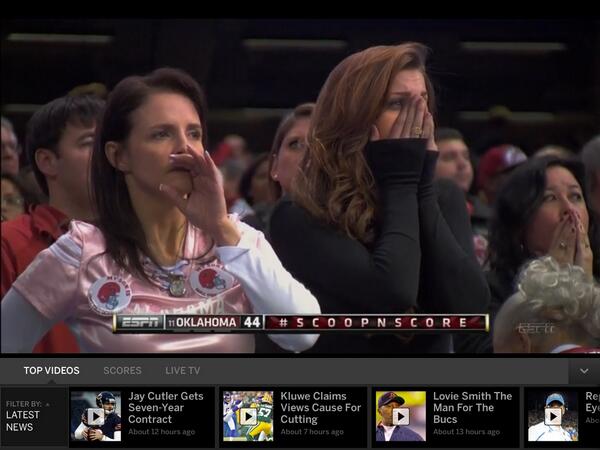
One of the unsettled sports media debates is how much focus a broadcast should put on athletes' significant others in the stands; do you ignore them completely, do you go full Brent Musberger on Katherine Webb, or do you try and find some middle ground? It may be less than a week into a new year, but we've already seen two widely divergent examples of this, and they both come from the same network—ESPN.
Ahead of the Fiesta Bowl on New Year's Day, there was plenty of discussion of UCF quarterback Blake Bortles' girlfriend, model Lindsey Duke, and Knights' coach George O'Leary even said "She deserves six million Googles" before the game. However, despite her apparent attendance, the broadcast didn't show her, and Fox Sports' Andre Vergara even wrote a story titled "No Katherine Webb-gate 2 with UCF QB's girlfriend at Fiesta Bowl."
Meanwhile, the next day saw Webb herself cheering on boyfriend A.J. McCarron and Alabama in the Sugar Bowl, and while there was no Musberger-level commentary on her from announcers Brad Nessler and Todd Blackledge, the ESPN truck kept going to her (and McCarron's mom Dee Dee Bonner, who was sitting with her) for reaction shots, including the one above taken when McCarron committed the game-sealing fumble. Why did the network take such different approaches?
While Musberger's early-2013 comments on Webb seemed over the line to many of us and led to an official apology from the network, they had plenty of supporters (including current Fox Sports personality Clay Travis, who blasted ESPN for its apology). ESPN and other networks clearly haven't retreated entirely from showing significant others, either; the repeated Sugar Bowl shots of Webb show that, and CBS cut to her several times during LSU-Alabama (leading to Verne Lundquist taking a shot at Musberger). There's an appetite for crowd shots, especially in college football broadcasts, and occasional looks at the families/significant others of those involved in the game aren't inherently wrong.
What seems problematic is when the shots become endless (as they tend to do every time Webb is involved), suggesting more opportunities for the audience to leer than to observe reactions. What's troubling is when you get commentary like the initial Musberger lines that suggested being a quarterback at Alabama automatically gets you a beautiful girlfriend; that trivializes both of the people involved. One way to avoid that (and the firestorm of controversy it created) is not showing a significant other at all, as happened with Duke. However, it's not the only way.
One of the best recent balancing acts with an attractive significant other came from HBO's 24/7, focusing on the NHL"s Toronto Maple Leafs and the Detroit Red Wings in the lead-up to Wednesday's Winter Classic. Toronto captain Dion Phaneuf happens to be married to actress Elisha Cuthbert (24, Happy Endings, etc), so an interesting question heading into the series was just how much it would focus on her. Unlike Webb, who was catapulted to fame by Musberger, Cuthbert was a star long before she started dating Phaneuf, so it would seem curious to ignore her completely, but this is also a hockey series, so endless shots of Cuthbert would seem gratutious. From this perspective, HBO seemed to find the right balance. There was an interesting clip of the two of them interacting at home and a segment with them skating together at the team's Christmas party, but that was about it, and the vast majority of the footage on Phaneuf (of which there was plenty) didn't even mention Cuthbert.
That might be a useful blueprint for broadcasters to use going forward. And this isn't just limited to significant others in the stands. Just watch a Patriots broadcast on CBS with Bob Kraft being shown almost after every play. Then there's the shots of Archie Manning any time one of his sons are playing (or especially when they're playing against one another.) And of course, Fox was rightfully criticized for missing a key World Series play because of their fixation on crowd shots last fall.
Sure, show these individuals from time to time, especially if they're notable in their own right or if they have a notable reaction, but don't obsess over them, and don't suggest that they only have value because of who they're with. There's nothing wrong with a reaction shot or two, but, from this perspective, the sports broadcasting world's better off without a repeat of the initial Musberger-Webb situation.







Comments are closed.